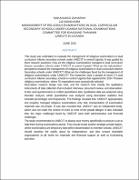| dc.description.abstract | This study was undertaken to evaluate the management of religious examinations in dual curriculum Islamic secondary schools under UNECIT in central Uganda. It was guided by three research questions; how are the religious examinations managed in dual curriculum Islamic secondary schools under UNECIT in central Uganda? What are the stakeholders’ perceptions towards the management of religious examinations in dual curriculum Islamic Secondary schools under UNECIT? What are the challenges faced by the management of religious examinations under UNECIT? The researcher used a sample of seven (7) dual curriculum Islamic secondary schools in central Uganda that registered for 2014 Thanawi religious examinations, where 76 respondents were purposively selected. Descriptive research design was used, and the research took mainly the qualitative instruments of data collection that included; interview, document review, and observation. It also used questionnaires to collect quantitative data. Qualitative data was analyzed using thematic analysis, while Quantitative was analyzed using descriptive statistics that included percentages and frequencies. The findings revealed that, UNECIT appropriately and properly managed religious examinations only that, transportation of examination materials was not proper. It was also revealed that, UNECIT was an independent body, which was not under the control of IUIU as most of the people alleged. It also indicated that, the major challenges faced by UNECIT were both administrative and financial challenges. The study recommended to UNECIT to always save money specifically to procure a car to help them during examinations period. They should create another strategic private station, where examinations are temporary kept before dissemination to member schools. UNECIT should sensitize the public about its independence, and also contact charitable organizations at all levels for materials and financial support as well as fundraising activities. | en_US |

